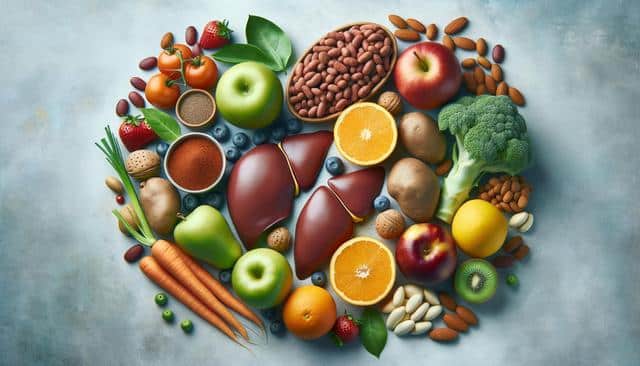
Useful Remedies That May Help Detox a Fatty Liver Naturally
Understanding Fatty Liver and Its Dietary Needs
Fatty liver disease is a condition in which excess fat builds up in the liver, potentially leading to inflammation or liver damage over time. While it can be triggered by various factors including obesity, insulin resistance, and alcohol use, diet plays a crucial role in both its development and management. Choosing the right foods and making consistent dietary adjustments can support liver health and may help reverse fat accumulation. The concept of the “Best Diet for Fatty Liver Reversal” often emphasizes whole, unprocessed foods and reducing intake of added sugars and saturated fats.
Key elements of a liver-friendly diet include high-fiber vegetables, lean proteins, and healthy fats in moderation. Whole grains such as oats and brown rice are commonly recommended due to their fiber content, which aids digestion and may help regulate blood sugar levels. Similarly, fruits like berries and citrus offer antioxidants that support liver function. These dietary choices are frequently identified among the “Best Foods for Fatty Liver” due to their nutritional density and liver-supportive properties.
Natural Foods That May Support Liver Detox
Many naturally occurring ingredients have long been associated with liver support and are commonly included in discussions about “How to Cleanse Fatty Liver”. While these do not replace medical treatments, they may offer complementary benefits. For example, cruciferous vegetables such as broccoli, Brussels sprouts, and cauliflower contain natural compounds that may enhance detoxification enzymes in the liver. Similarly, leafy greens like spinach and kale are rich in chlorophyll, which some believe can help neutralize heavy metals and other toxins.
Other commonly recommended foods include:
- Garlic: Contains selenium and allicin, which may support liver cleansing processes.
- Turmeric: Known for its anti-inflammatory properties, turmeric may help reduce liver inflammation.
- Green tea: Rich in catechins, a type of antioxidant that may support liver health.
Incorporating these into meals regularly can be a practical way to support liver function naturally. It’s essential, however, to maintain balance and avoid excessive consumption of any one ingredient.
Reducing Harmful Foods and Enhancing Nutritional Intake
Equally important to adding beneficial foods is the need to reduce or eliminate items that can worsen fatty liver. Diets high in refined sugars, trans fats, and processed foods are often linked to poor liver outcomes. Beverages sweetened with high-fructose corn syrup, for example, have a strong association with increased fat accumulation in the liver. For those seeking the “Best Diet for Fatty Liver Reversal,” minimizing such items is a foundational step.
Instead, focus on nutrient-dense alternatives that provide steady energy and support metabolic health. These include:
- Legumes: Beans and lentils are high in fiber and plant-based protein.
- Fatty fish: Rich in omega-3 fatty acids that may reduce liver fat levels.
- Avocados: Provide healthy fats and antioxidants without overloading the liver.
Simple cooking techniques like steaming, grilling, or baking can also help retain nutrients without introducing excessive oils or additives.
Lifestyle Habits That Complement a Healthy Diet
Beyond food choices, certain lifestyle habits can significantly influence liver health. Regular physical activity, for instance, supports weight management and insulin sensitivity, both of which are important in reducing liver fat. Even modest weight loss, around 5% to 10% of body weight, has been associated with improvements in fatty liver markers.
Other lifestyle practices that may support liver health include:
- Staying hydrated: Water aids the digestive system and supports detoxification.
- Managing stress: Chronic stress can negatively impact metabolism and liver function.
- Avoiding alcohol: Alcohol can exacerbate liver damage, especially in those with fatty liver disease.
When paired with a thoughtful diet based on the “Best Foods for Fatty Liver,” these habits can offer a holistic approach to liver care.
Monitoring Progress and Staying Consistent
Managing fatty liver is a gradual process that requires consistency and awareness. Keeping a food journal or working with a healthcare provider can help track improvements and identify which foods are most supportive for individual needs. Blood tests and imaging may also be used to monitor liver function and fat levels over time. As individuals explore “How to Cleanse Fatty Liver” through natural means, it’s vital to avoid drastic cleanses or unproven detox products, which may do more harm than good.
Instead, focus on building sustainable habits that prioritize whole foods, support digestion, and reduce overall liver strain. Over time, these efforts can contribute to a healthier liver environment and potentially reduce the effects of fatty liver disease. Patience and persistence are key, as the liver is a resilient organ and may respond positively to dedicated care.
Conclusion: A Practical Path Toward Liver Wellness
Managing fatty liver through diet and lifestyle is a practical and empowering approach that many people are embracing. By focusing on the “Best Diet for Fatty Liver Reversal” and incorporating the “Best Foods for Fatty Liver,” individuals can make informed choices that support long-term liver health. Avoiding harmful ingredients, adopting supportive habits, and staying consistent are essential steps on this path. While natural remedies and foods can offer valuable support, it’s always important to work with healthcare professionals to develop a personalized plan. With care and commitment, improving liver function and overall well-being is a realistic and achievable goal.


